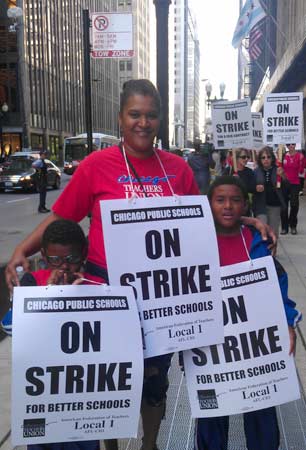When a teachers’ strike started to look like a realistic possibility earlier this spring, CPS Chief Communications Officer Becky Carroll warned the readers of Catalyst, “Any talk of a strike is the wrong message to send our schools, students and taxpayers.” For her, and the rest of the privatization evangelists at CPS, the “right” message is simple—shut up and do what you’re told.
Of course, Carroll, who makes $165,000 per year, isn’t paid that kind of money to tell the truth. Luckily for us, neither Chicago teachers nor the larger education community are giving much credence to CPS talking points.
The corporate education “reformers” have been experimenting on Chicago’s most underserved students and schools for more than two decades, trying any quick-fix makeovers so long as such schemes keep the public out of the discussion on how best to educate our city’s children. The so-called innovations taking place in charter and turnaround schools are making chaos of students’ formative years and relegating the art of teaching to rote instruction.
Faced with such a dire situation, the Chicago Teachers Union’s decision to strike is perhaps the best lesson they could have planned—when the powers that be are shutting you out of your life, you must take a stand. And it’s a lesson that teachers themselves learned from the communities they serve.
Before CTU President Karen Lewis and members of the Caucus of Rank-and-File Educators (CORE) became the new union leadership in 2010, the CTU, like its national union, the American Federation of Teachers, was a willing pawn in the privatization game. CORE broke from the CTU leadership and won respect from the majority of union members by actively supporting parent- and student-led protests at schools across the city. After gaining office, they continued to organize against privatization with the already active education community, and to educate its own members about the importance of doing so.
Chicago students are already at the forefront of the fight. Dyett High School students, along with students from 16 other states, have petitioned the Department of Education to investigate racial disparities in the allocation of school resources. They’ve already met with officials at the Department of Education, and on September 20, they’ll be taking “Freedom Rides” to Washington, D.C., to bring more attention to their cause.
Meanwhile, hundreds of students at Social Justice High School in Little Village have disrupted their school day with sit-ins to protest the dismantling of their school. So CPS shouldn’t worry about the strike giving “wrong” ideas to students—the students are already leading the charge, and are just in their cause.
If anything, they should worry about these students further influencing the CTU. Unlike its portrayal as a selfish bully in the 1% Chicago Tribune, the CORE-led CTU has been a partner to community groups fighting for quality public education. Now, hostile contract negotiations have opened a window for the union to elevate the anti-privatization fight to a national level.
As former CPS CEO Arne Duncan continues to spread the hollow gospel of corporate reform as the nation’s secretary of education, and as his predecessor Paul Vallas preaches the same throughout South America, it’s about time that Chicago, the birthplace of this failed faith, denounces it publicly.
Angry, shocked, overwhelmed? Take action: Support independent media.
We’ve borne witness to a chaotic first few months in Trump’s presidency.
Over the last months, each executive order has delivered shock and bewilderment — a core part of a strategy to make the right-wing turn feel inevitable and overwhelming. But, as organizer Sandra Avalos implored us to remember in Truthout last November, “Together, we are more powerful than Trump.”
Indeed, the Trump administration is pushing through executive orders, but — as we’ve reported at Truthout — many are in legal limbo and face court challenges from unions and civil rights groups. Efforts to quash anti-racist teaching and DEI programs are stalled by education faculty, staff, and students refusing to comply. And communities across the country are coming together to raise the alarm on ICE raids, inform neighbors of their civil rights, and protect each other in moving shows of solidarity.
It will be a long fight ahead. And as nonprofit movement media, Truthout plans to be there documenting and uplifting resistance.
As we undertake this life-sustaining work, we appeal for your support. We have 7 days left in our fundraiser: Please, if you find value in what we do, join our community of sustainers by making a monthly or one-time gift.
